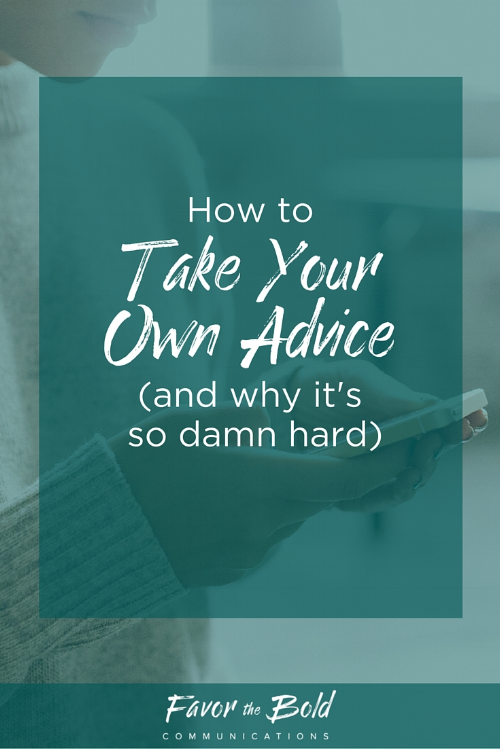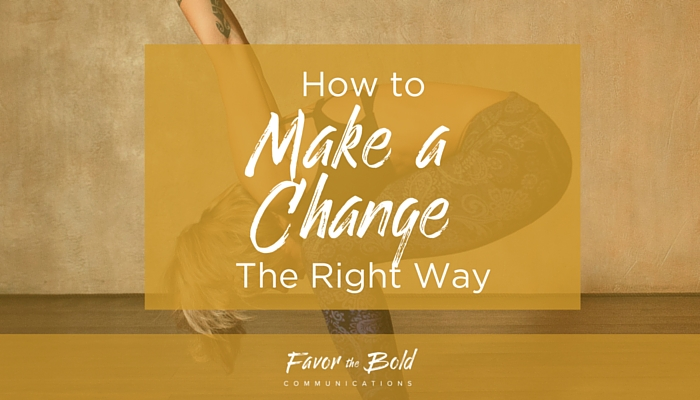Unless you’re completely new here (in which case, welcome!), you know that telling people what to do is kinda my thing. I love giving advice. I’ll find any excuse to "should" all over someone, even if I’m just regurgitating someone else's wisdom.
But do I actually take my own advice? Nope.
So as much as I love you, I'm writing this one for myself. Every week I write about putting yourself out there, leaning into fear, staying productive, being ok with making mistakes. And every week, I’m freaking out about every single one of those things.
So I've given a lot of thought to this: how to actually take my own advice for once, and how you can too. I've come up with a 3-step process; and I even wrote it down on a Post-it note that’s stuck on my computer screen, so you know I’m serious.
1. Awareness is the first step
I know, this sounds like some life-coachy BS but pausing long enough to realize you’re doing something that you would advise against is a serious step forward. How many times have you received advice from someone who you know isn’t implementing it? You know, the friend who’s super disorganized who tells you how to manage your priorities?
Awareness is the first step to being more intentional.
So when you start feeling like a crazy person, take a breath, slow down for just a second, and allow yourself that time to recognize that you’re doing something you shouldn’t.
And when that little voice in the back of your head raises the alarm, listen to it.
2. Take some distance
Have you ever had a friend come to you for advice, and the answer seems so obvious that you don’t understand how they can’t see it themselves? That’s the power of distance.
When you’re so close to your problem, you simply can’t see it for what it is. Doing a maze on paper and being in a maze are two very different things.
If you want to be able to find the answers to your own questions, you have to take distance from them.
That looks different depending on the situation. Yesterday, for example, I had to physically distance myself from the problem: the answer only came to me when I got up, away from my computer and went for a walk. For other situations, it might mean forcing yourself to argue from another point of view, being your own devil’s advocate. Or maybe it means writing the problem down and working it out on paper.
It doesn’t matter how you do it. What matters is that you force yourself out of the patterns that got you in the situation in the first place.
3. Give yourself the advice you’d give someone else
This is what that little voice asked me to do, and let me tell you, it worked. Imagine a friend comes to you with the same problem you have. What would you tell them?
Forget the backstory. Forget all the reasons you have in your head for why you’re doing what you’re doing. Force yourself to role-play, even if you feel like an idiot.
And don't forget to play both sides. First, articulate exactly what the problem is. Do it out loud, or write it down, but make it clear-- to yourself-- what exactly has you stressed or worried. Sometimes this step is all you need to realize that it’s not as bad as you think.
And then once you’ve articulated the problem, give yourself the advice you’d give to someone else. And give it the way you’d give a friend, which means:
Challenge your excuses
Maybe tough love isn’t your style, and that’s ok. But if your friend was making BS excuses for why she couldn’t do something, would you just let it go and give up? Probably not.
Why? Because you care about her enough to help her, even if that means challenging her a little bit. So extend the same favor to yourself.
And while you’re at it:
Give yourself some compassion
Compassion is something we gladly give others, but rarely offer to ourselves.
Once you’ve realized that you need to take a step back and figure stuff out, don’t berate yourself for not having the answer or for not figuring things out sooner. Would you ever tell a friend that she’s an idiot for needing advice? (Hint: The answer should be “no.”)
So why are you doing it to yourself?
*Bonus* Remember this the next time you’re giving advice
(I know I said 3 steps, but maybe I lied.)
So you’ve taken a pause and some distance from your problem to see it for what it is. You’ve articulated the problem and given yourself sage advice in a firm, yet loving way. You’ve taken your own advice and are now well on your way. End of story, right?
Not quite.
If I've learned anything from this, it’s that taking advice isn’t easy. Things can seem so clear from one perspective, and a veritable clusterf*ck from another.
And I want to remember this the next time I'm giving advice to someone else.
When I find myself should-ing all over someone, I want to remember that it’s a lot easier said than done. It’s much easier for us to tell someone what to do than to do it ourselves.
We should only give advice if we can also give compassion.
Because in the end of the day, we should be giving advice because we genuinely want to help someone, not because we want to prove we have the answer.
And that's advice I need to take.











